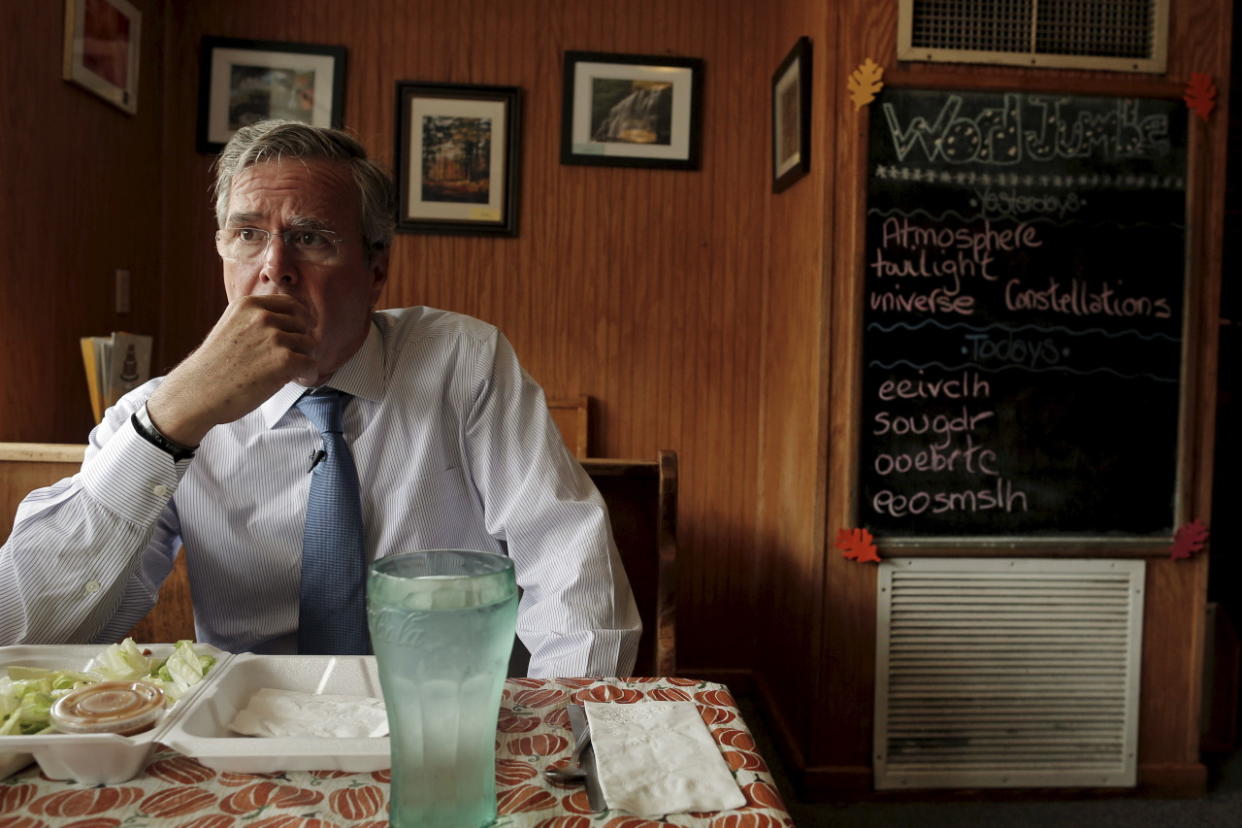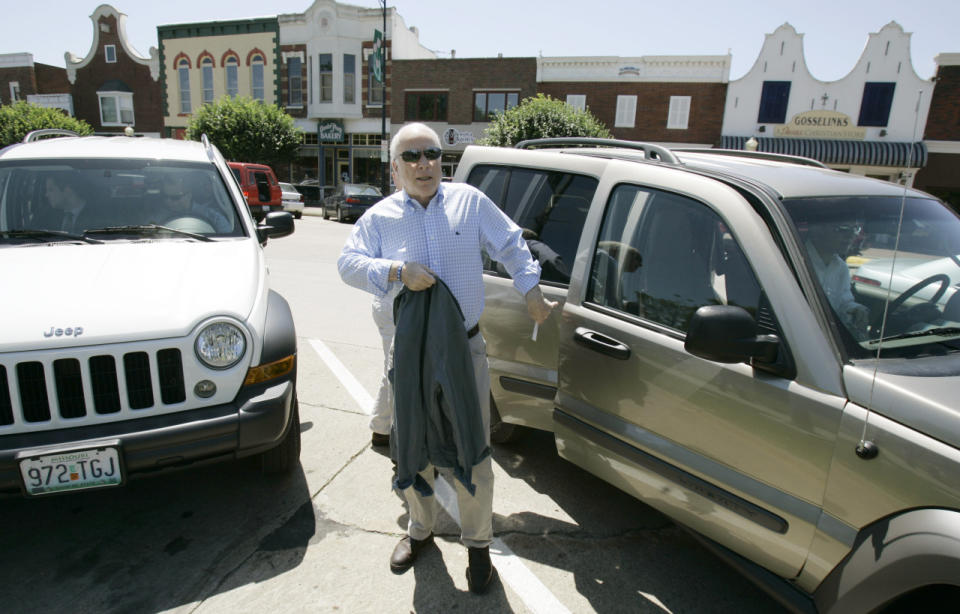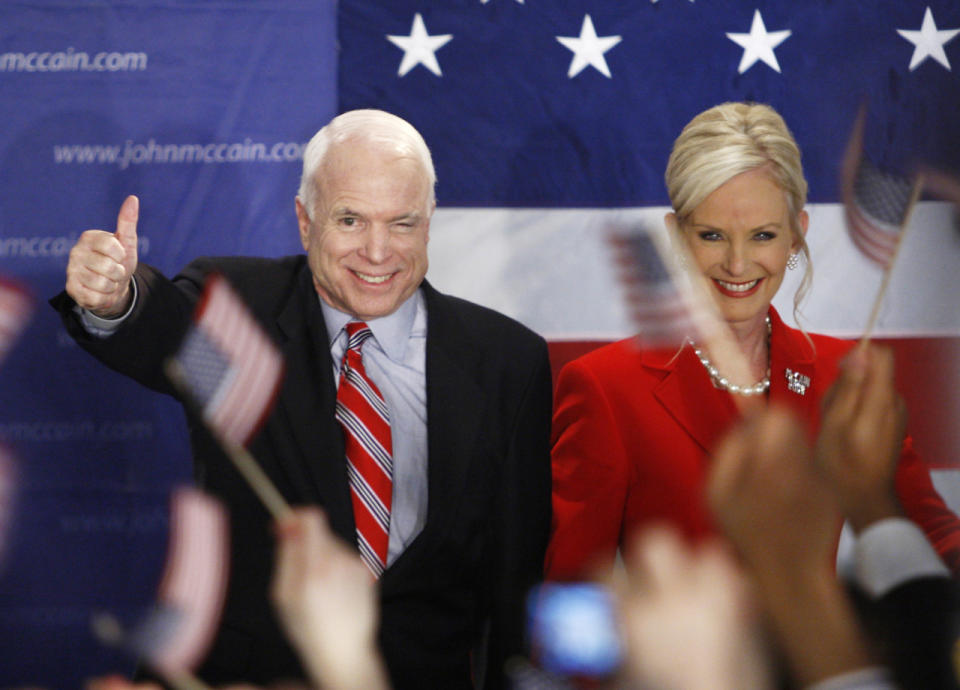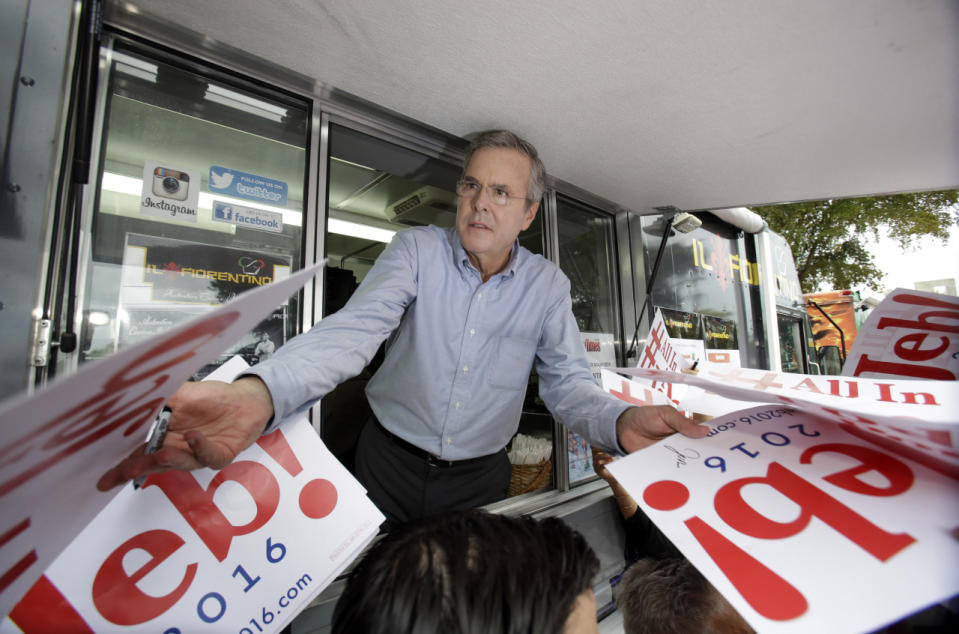Jeb Bush loves to invoke John McCain’s amazing 2008 comeback. Not so fast.

GOP presidential candidate Jeb Bush at Nonie’s Restaurant & Bakery in Peterborough, N.H. (Photo: Brian Snyder/Reuters)
Jeb Bush has told the story again and again in recent weeks.
Eight years ago this month, the former Florida governor was walking through the Atlanta airport when he ran into a familiar face: Arizona Sen. John McCain, who was then in the middle of a bruising fight for the 2008 Republican presidential nomination.
Like Bush at the beginning of the 2016 campaign, McCain had entered the 2008 race as the candidate to beat. He sat atop many early GOP primary polls and had won the backing of most of the party establishment. But by June 2007, his campaign had collapsed amid sinking poll numbers. He ran out of money, most of his staff quit (including Danny Diaz, who is now running Bush’s campaign), and many wrote him off as a political goner whose presidential dreams were done.
“It’s effectively over,” election expert Charlie Cook told Newsweek that summer. “The physicians have left the hospital room, and it’s the executors of the state that are taking over.”

Sen. John McCain arriving at a town hall meeting in Pella, Iowa, in June 2007, just weeks before his 2008 presidential campaign imploded. (Photo: Charlie Neibergall/AP)
But McCain, a former prisoner of war in Vietnam, refused to give up —astonishing everyone, including Bush, it seems. As the former governor has recalled in several television interviews and on the stump in New Hampshire, he was surprised to see McCain transferring planes in Atlanta that October, absent of staff, on his way to a campaign event even though his 2008 bid “was supposed to be ended.”
“He can’t even raise his left hand because of being tortured, [but] he was carrying his own bag,” Bush told MSNBC’s “Morning Joe.” “He was campaigning for president of the United States by himself. He won the Republican nomination.”
It’s easy to see why Bush finds that story of McCain so inspiring. Like McCain eight years ago, the former Florida governor is grappling with his own campaign struggles of late.
Once viewed as the frontrunner in the 2016 nomination race, Bush is now fighting for traction against political outsiders like Donald Trump and Ben Carson. Though he’s raised more money than any of his opponents, Bush has also spent more. Last week, amid a drop in fundraising, the former governor moved to dramatically curtail his campaign costs by slashing staff salaries, downsizing his political operation and curbing travel costs in order to have money to compete in the early states.
Bush has denied his campaign is in trouble, insisting he’s only adapting to the changing political dynamics of the race by adopting a “lean and mean” operation. At the same time, he and his supporters have latched on to the comeback story of McCain eight years ago, arguing that it’s proof that in spite of what the early polls say, the race is hardly over.
Though there are some similarities, the analogy Bush has drawn between his campaign and McCain’s isn’t entirely right. The circumstances McCain found himself in eight years ago — and the way he eventually clawed his way back — are significantly different than the challenges Bush faces in the less than 100 days before voting officially kicks off in Iowa.
Like Bush, McCain entered the race as the party’s de facto nominee, a scenario that was quickly upended by Mitt Romney, the former Massachusetts governor who had cast himself as a fresh face on the scene. But it was McCain’s own positioning that was his biggest problem.
After coming in second to George W. Bush in the 2000 GOP primary, McCain had spent several years remaking his image from a maverick insurgent to an establishment-friendly Republican close to the conservative base. Though he still tooled around in a bus he called the “Straight Talk Express,” McCain had become unrecognizable to the voters who had supported him eight years earlier.
His campaign went into a free fall, and McCain seemed frustrated and out of sorts. Yet he still had a deep history with voters, especially in New Hampshire, where he had won an upset victory over George W. Bush in 2000. Soon, the Arizona senator’s goal quickly became to shed that new persona and remind voters why they’d liked him so much in the first place.

McCain and his wife, Cindy, acknowledge supporters at his New Hampshire primary night rally in January 2008. (Photo: Mike Segar/Reuters)
According to a former McCain adviser who didn’t want to be quoted bad-mouthing any of the candidates, Bush doesn’t have that same bond with voters, who identify him more with his family legacy than his individual brand. “One of Jeb’s biggest problems is that he doesn’t have that relationship with people in the way someone like McCain did,” the adviser said. “You know him, but you don’t know him. I don’t think you could ever say that about McCain.”
That summer, McCain dropped in the polls — but rarely below 15 percent. (Bush, facing a larger field, is currently in single digits.) Still, McCain found himself trailing Romney, former New York City mayor Rudy Giuliani and even former Tennessee Sen. Fred Thompson, who flirted with the race for months before finally declaring his candidacy that September.
Even with a bare-bones operation, McCain began to craft a “comeback narrative” around his candidacy, recalled Steve Schmidt, who had stayed on as the senator’s top political strategist. McCain focused his campaign on New Hampshire, where he’d won before. Issues that he’d stopped talking about to avoid enraging the party base suddenly came up again, including his support for campaign finance reform. But he focused much of his campaign on a single unpopular issue: his support for President George W. Bush’s troop surge in Iraq, which many of his rivals opposed. “I’d rather lose the election than lose a war,” McCain said at the time.
Suddenly, the scrappy McCain who most voters recognized was moving back up in the polls.
“He took a position of courage, and voters saw him as a statesman,” recalled Schmidt, who described it as a turning point in the campaign.
According to former McCain aides, Bush seems to lack that kind of galvanizing issue which could perhaps propel him back to the forefront of the race. And he doesn’t appear to have an early primary state where he could begin that comeback narrative. Even in Florida, a state he led for eight years, Bush is trailing in early primary polls to Trump, Carson and Florida Sen. Marco Rubio.

Bush signs autographs from the window of a food truck after formally announcing he would join the race for president in June. (Photo: Wilfredo Lee/AP)
In recent weeks, Bush, in relating the McCain analogy, has cited “leadership skills” and government experience as what’s driving his campaign. But it’s unclear how that will change anything in an election that has so far been dominated by an electorate angry with the party establishment and intrigued by outsider candidates. What Bush’s campaign appears to be hoping is that doubling down on government experience will be seen as a courageous — and perhaps campaign-saving — move.
“This is how it works. People want you to walk on the hot coals,” Bush told “Morning Joe” this month. “You have to show that you care about people, that you have a heart, that you have a sense of humor, that you have ideas to lift people up.”


